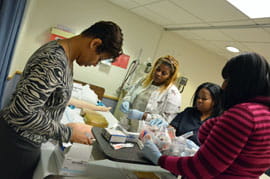The First Steps Toward a Successful Career

- Partnerships and Projects: Drexel's Recent Industry and Civic Engagement Connections
- Drexel University Won’t Hold Classes on Election Day
- Partnerships and Projects: Drexel's Recent Industry and Civic Engagement Connections
- Dornsife Center for Neighborhood Partnerships Honors Tuskegee Airmen and Women

Marquita Freeman-Walker said she has only lived “a few steps away” from Drexel for most of her life. But it wasn’t until she was accepted to the Drexel’s Certified Medical Assistant Pipeline Program, a collaboration with University City District’s West Philadelphia Skills Initiative, that the West Philadelphia resident said she felt like success was tangible.
“Honestly, for me, this is life-changing,” Freeman-Walker said. “This is not a game to me—this is the start of my career.”
Freeman-Walker is one of 24 participants currently in the pipeline program, which provides paid technical skills training, professional development training, mentoring by seasoned medical professionals, career development and job coaching services and a number of job opportunities through Drexel’s College of Medicine. The opportunity was open to individuals who were unemployed, residents of West Philadelphia and certified medical assistants.
Human Resources’ Workforce Development Manager Sarah Steltz helped develop the program along with Sheila Ireland, director of the West Philadelphia Skills Initiative. The selection process for the program is highly competitive. During preliminary research, Steltz and her colleagues discovered there was not only a high turnover rate for medical assistants in the College of Medicine, but also a noticeable number of unemployed certified medical assistants in the immediate area.
“The idea is to give them an understanding of Drexel’s College of Medicine,” Steltz said. “They’re gathering basic new employee knowledge that someone else coming into an interview might not have.”
Steltz said the program pays participants during training thanks to generous support from the University City District and a wage subsidy of 50 percent provided by the Philadelphia Workforce Development Corporation.
“From a civic engagement perspective it’s about doing the right thing,” Steltz said. “The president’s mission is to engage the community, and that’s what we’re doing, while also meeting the needs of our institution.”
The six-month program is broken down into four phases. First, participants are put through a “workplace boot camp,” which includes IDX and Allscripts training with the College of Medicine’s Information Technology department and technical training in the College of Nursing and Health Professions’ state-of-the-art simulation lab.
During the second phase of the program, trainees will spend 20 hours of on-the-job training and 20 hours in the classroom, honing their customer service and emotional intelligence skills.
“I’ve learned that customer service is one of the most important parts of any job, but especially in a hospital setting,” Freeman-Walker said.
Participants then transition to working in the field for 32 hours per week and an additional eight hours learning about financial literacy and career exploration.
In the final 10 weeks of the program, a full 40 hours are dedicated to on-the-job training, with career counseling available at any time throughout the six months of the program and for six months post-placement.
Freeman-Walker, who learned about the program while studying at Philadelphia Job Corps, said she hopes the first six months are only the beginning of a career at Drexel. As the mother of two toddlers, she said she wants to expand her knowledge of medicine and eventually complete additional training.
“I come home with my blood pressure cuff, and my daughter says, ‘I want to try!’” Freeman-Walker said. “I wanted to actually know what to do when my daughter comes to me with a boo boo. Now, it’s about a lot more than that. Working here, I’m showing my daughter I’m doing something great.”
To learn more about the program, click here.
--Maria Zankey, University Communications
In This Article
Drexel News is produced by
University Marketing and Communications.